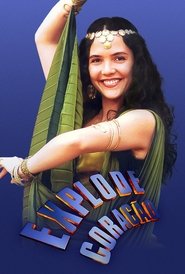Popular Soap TV Series on Tub Tv - Page 12
-
Scarlet Letter
2010
Scarlet Letter
2010
star 3Successful television screenwriter Kyung-seo's life spins out of control after she accidentally kills her best friend's fiancé. Four people paying the consequences for a love that went wrong. One woman endures poverty and a guilty conscience while the other woman plots revenge after her career takes off. Then a twisted fate brings the two women back together. Four people stained by adulterous affairs. -
Soap
1977
Soap
1977
star 7.3The antics of a wealthy family, the Tates, and a working-class family, the Campbells, in the fictional town of Dunn's River, Connecticut. -
Sinhá Moça
2006
Sinhá Moça
2006
star 6.7Monarchists and republicans meet in Araruna, a small fictional town in the interior of São Paulo, in 1886. The novel portrays the love story of the beautiful and wealthy Sinhá Moça - daughter of the slave, Barão Ferreira de Araruna, and sweet and submissive Mother Candida - , with the young abolitionist lawyer Dr. Rodolfo Fontes - son of Dr. Fontes, and the housewife Inêz. Together, they face the difficulties in the campaign for the abolition of slaves. -
Poor Nastya
2003
Poor Nastya
2003
star 4.1Poor Nastya is a Russian telenovela originally aired from 31 October 2003 to 30 April 2004 on the STS. Based on the imperial setting of the 19th century, the series reached international success and was shown in Ukraine, China, Israel, Serbia, Georgia, Greece, Bulgaria and more than twenty countries worldwide. With the budget of $11,8million, it is the most expensive Russian television project of all time. The sequel was planned, but had not been made yet. -
Milo
2024
Milo
2024
star 8.7The telenovella 'Milo' is a modern musical fairy tale. The series tells the story of Milo, a very talented baker's daughter with a golden voice, who is forced to hide her talent from the outside world. No matter how hard she dreams of a life full of singing and music. -
Love in Difficult Times
2005
star 4.2Amar en tiempos revueltos is a Spanish soap opera set in the times of the Spanish civil war and the early Francoism. The serial has been aired from 2005 and has won prizes in Spain and a Silver Medal in the «New York Festivals». In January 2013 will air on Antena 3 with new name, Amar es para siempre -
Volta por Cima
2024
-
Explode Coração
1995
Explode Coração
1995
star 6.5Gypsy traditions set the stage for Explode Coração, which highlighted a new subject at the time: love relationships via the internet. Dara is a young gypsy woman who is proud of her origins, but refuses to be stuck with traditions. She lets her rebellious soul speak louder and breaks a tradition of her people: she refuses to marry Igor, the promised groom. The news falls like a bomb to her parents, Jairo and Lola, and is great for Yanka, her younger sister, in love with the boy. But Igor only has eyes for Dara and fights for that love. Indifferent to the consequences of his decision, Dara meets, in a computer conversation, the businessman Júlio Falcão, who moves her heart. Julio is the man who loves to make money and seduce women. He lives a marriage of appearances with Vera. Separated by the world, people as different as Júlio and Dara cross and fight against all for a love that has old traditions, and Igor and Vera as the biggest obstacles. -
India: A Love Story
2009
India: A Love Story
2009
star 7.5The daughter of a traditional, rich Indian family falls in love for a Dalit, and "untouchable" man. -
Sweet Diva
2019
Sweet Diva
2019
star 7.3Maria da Paz is a committed baker who becomes a wealthy businesswoman twenty years after a tragedy strikes on the day of her wedding to Amadeu. From this broken union a baby is born, Jô, who seeks power and despises her mother’s humble origins. Afraid that her parents’ reunion might spoil her plans, Jô starts an alliance with the charming Régis to convince Maria to marry him and, together, they plan to steal all of Maria’s fortune. In this exciting telenovela written by Emmy Awards winner Walcyr Carrasco, Maria’s optimism must be stronger than Jô’s ambition when the baker finds out about the betrayal and her own daughter’s dangerous secrets. -
Walking on Clouds
1999
-
Prisoner of Love
2016
Prisoner of Love
2016
star 4.3After his mother left his father for another man, Ömer’s perception of women was forever damaged, and he considers them unreliable, untrustworthy and even dangerous. The only woman he has time for is his beloved sister Ayse, for whom he would do anything. Ayse herself is a great romantic and wants nothing more than for her brother to be happy and find love for himself. When she falls ill, and with only months to live, Ömer understands that the only way for his sister to die happy is for him to be married -
Coração de Estudante
2002
-
Don't Mess with the Angel
2008
star 7.5Cuidado Con El Ángel is a Telenovela distributed by Televisa starring Maite Perroni and William Levy. The telenovela, a production of Nathalie Lartilleux, premiered on June 9, 2008 and finished its broadcast March 6, 2009. It had millions of viewers worldwide, and broke records in America. -
Santa Bárbara
2015
-
La Doña
2016
La Doña
2016
star 7.4A story of revenge and ambition, seduction and betrayal; all told from the perspective of an offended and abused woman named Altagracia. Altagracia represents the hundreds of thousands of Mexican women who have been victims of the violence by faceless men who are protected by impunity. But Altagracia, transformed into a strong-willed, ruthless man-eater known as La Doña, will seek out each and every one of these men to bring them to justice. -
Golpe bajo
2000
Golpe bajo
2000
-
Love of Life
1951
Love of Life
1951
star 5Love of Life is an American soap opera which aired on CBS from September 24, 1951, to February 1, 1980. It was created by Roy Winsor, whose previous creation Search for Tomorrow had premiered three weeks before Love of Life, and who would go on to create The Secret Storm two and a half years later. -
Brusko
2013
Brusko
2013
star 4.5A romantic and passionate love story. The love of two young people, Achilles from Cyprus and Melina from Crete, could be based on the timeless story of Romeo and Juliet. This is a modern adaptation of the archetypal myth, which tells the story of a great love. -
Kumkum Bhagya
2014
Kumkum Bhagya
2014
star 3.6Follow the life of Punjabi matriarch Sarla Arora who runs a marriage hall and lives with the hope of seeing her two daughters Pragya and Bulbul who're poles apart, happily married some day.
 Netflix
Netflix
 Amazon Prime Video
Amazon Prime Video
 Apple iTunes
Apple iTunes
 Apple TV Plus
Apple TV Plus
 Disney Plus
Disney Plus
 Google Play Movies
Google Play Movies
 Paramount Plus
Paramount Plus
 Hulu
Hulu
 HBO Max
HBO Max
 YouTube
YouTube
 fuboTV
fuboTV
 Peacock
Peacock
 Peacock Premium
Peacock Premium
 Amazon Video
Amazon Video
 The Roku Channel
The Roku Channel
 AMC+
AMC+
 Kocowa
Kocowa
 Hoopla
Hoopla
 The CW
The CW
 Vudu
Vudu
 Starz
Starz
 Showtime
Showtime
 PBS
PBS
 Pantaflix
Pantaflix
 FXNow
FXNow
 Tubi TV
Tubi TV
 Kanopy
Kanopy
 Comedy Central
Comedy Central
 Crunchyroll
Crunchyroll
 Microsoft Store
Microsoft Store
 Redbox
Redbox
 Sun Nxt
Sun Nxt
 ABC
ABC
 DIRECTV
DIRECTV
 Crackle
Crackle
 Fandor
Fandor
 Plex
Plex


















